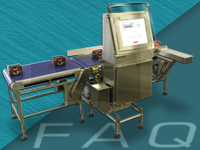Checkweigher FAQ
 What is the difference between an in-motion checkweigher and static checkweigher?
What is the difference between an in-motion checkweigher and static checkweigher?
A static checkweigher can only weigh an item that is not moving (i.e. static). Static checkweighers cannot have any motion on the load cell since it can take several seconds to stabilize. In addition, any product movement causes the load cell readings to oscillate resulting in unstable readings.
An in-motion checkweigher (checkweigher) can weigh an item while in motion (i.e. dynamic) and then reject a product that is out of spec. Checkweighers must obtain accurate weighments in fractions of a second. Parameters such as product contents, product transfer and overall system design are much more relevant with checkweighers since moving parts can affect weighments. However, technology has improved significantly over the last decade such that in motion weighing is almost as accurate is static weighing.
Why are so many companies now using checkweighers?
Checkweighers are ideal for ensuring product consistency. They do this based on product weight. They offer 100% product sampling. Checkweighers can alert management to under-filled containers thereby preventing a potential recall. They can also alert supervisors to overfilling which costs the company lost revenues. Checkweighers do these tasks consistently, reliably and can have a payback of less than 12 months.
What is the payback for a checkweigher?
While every situation is unique, checkweighers typically have a payback of less than 12 months. Companies, like food processors, can fill millions of containers a year. Being able to identify an overfill condition by even a few grams per container and adjust the filler, can save a company tens of thousands of dollars a year.
With the rise of social media it is vitally important that customer receive exactly what they are expecting. Sending a few products out with 1 or 2 missing components can result in negative social media frenzy. That will ultimately hurt sales. Your company name is at stake and a checkweigher can help you maintain brand integrity.
What industries use checkweighers?
Checkweighers are ubiquitous throughout almost all industries. They are very prevalent in the food industry since almost all food is sold based on weight. However, they are also used in other industries such as the cell phone industry. Checkweighers are sensitive enough to detect a missing SIM card and divert the package for rework!
Even products that are sold by quantity (i.e. CDs, pills, screws) can have their quantity verified with a checkweigher. The close relationship between quantity and weight makes this possible.
If the quality of your process can be measured by weight, which covers about 99% of all processes, a checkweigher might be the solution for you.
What causes product weight variations?
Filling a product during production is subject to dozens of random events, such as nozzle area reduction due to product accumulation, humidity changes, temperature changes, voltage spikes, changing product density, inattentive personnel, and many others. It is virtually impossible to achieve an exact fill every time. This results in needing a checkweigher to ensure that product fill is within certain weight ranges, thereby complying with National Institutes of Standards and Technology (NIST) laws.
What affects checkweigher accuracy?
The conditions that affect checkweigher accuracy are the following:
- temperature variations of the environment
- floor vibration from nearby machines
- air currents
- dust falling on the scale during a shift
- product accumulation
- static buildup from moving product
- electrical noise caused by other electronic devices (cell phones, walkie-talkies, etc.) in the vicinity of the checkweigher
- electrical noise in the power supply.
How can I keep these effects to a minimum?
- Clean frequently
- Install a draft shield to minimize air currents
- Maintain a constant temperature environment
- Install a power conditioner for reducing electrical noise
- Ensure all metal components are well-grounded
What type of products cause the most issues for checkweighers?
Any product that has contents which can shake or vibrate can cause problems. This often will include containers with liquids inside such as soups, beverages, shampoos, or liquid concentrates.
Products which have a high center of gravity will also cause problems because the product may tend to wobble as it is transferred onto the checkweigher. This wobbling results in less time for attaining an accurate weight.
What can the facility do to improve checkweigher accuracy?
- Product guide rails installed before and the checkweigher can help insure product stability.
- Use an automatic tare if product build-up is a concern on the checkweigher
Are there any considerations to choosing product containers for improving checkweigher accuracy?
- Use containers which have a low center of gravity.
- Containers with rigid construction are better than containers that can flow freely (i.e. rigid plastic vs. free-flowing plastic bags)
Can I be held legally liable for unknowingly under-filling product?
Yes. If your product does not meet or exceed the product label weight, you can be held liable. One of the biggest threats is from consumer advocate groups that can buy your product in a store and then weight it for accuracy. If they find several packages that are underweight, you can bet your company will soon be listed on their website and/or in the news. In addition, state Weights and Measures offices can take action in the form of oral recommendations, instructions, warnings or legal actions.
